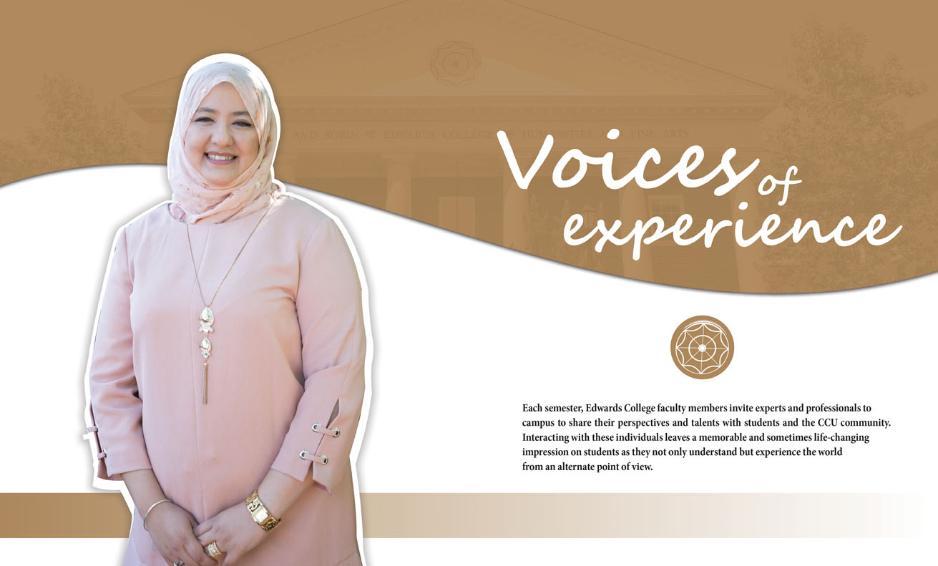
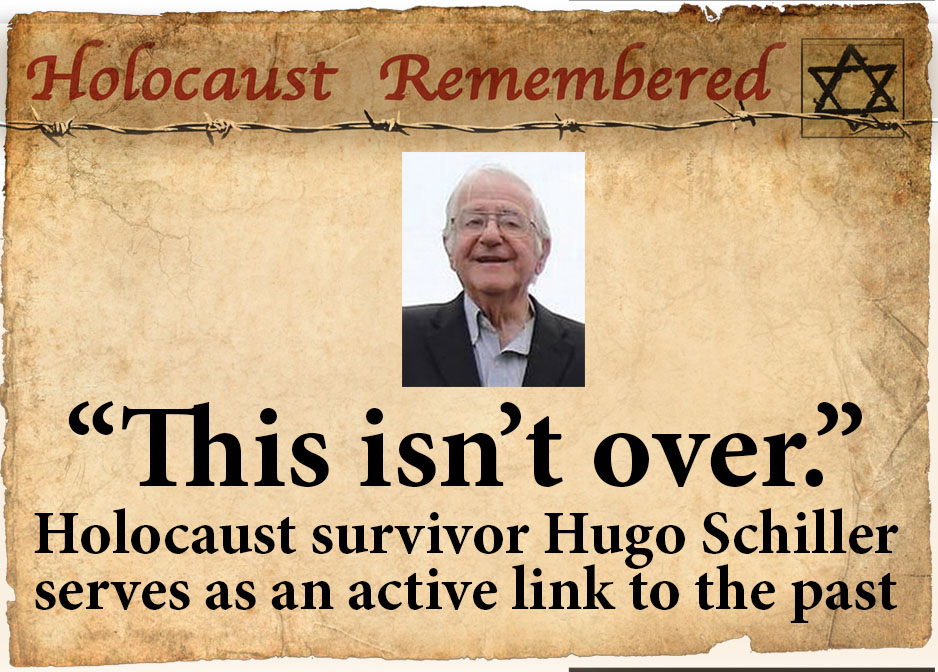
Holocaust Remembered
Holocaust survivor Hugo Schiller’s CCU lecture in March 2018 served as a reflection, a lesson and a warning.
Schiller’s presentation, “A Voice from the Holocaust,” drew a standing-room-only crowd of students, faculty and community members in the Coastal Theater. In addition to relating the story of his deportation, separation from his family and secret deliverance out of Europe as the Nazi regime gained power, Schiller emphasized the importance of maintaining a collective societal memory so the enormity of the event is not lost or minimized.
“When the last of us survivors are gone, when the last American liberators of the camps are gone, there will be no live witnesses,” said Schiller. “When this recedes into the pages of history, it loses its horror. It creates a greater possibility that it can happen again.”
The lecture took place in conjunction with a mobile exhibit from the Columbia Holocaust Education Center titled “Holocaust Remembered,” on display in Kimbel Library during March. The exhibit was created to honor memories of the survivors and victims of the Holocaust and liberators of concentration camps who now live in South Carolina. 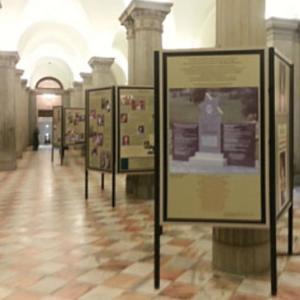
At 9 years old, Schiller was deported from Grunsfeld, Germany, to Gurs, a concentration camp in France. His parents were transported to and executed at Auschwitz, and Schiller moved to a children’s home in a group of 48 Jewish children. In 1942, facilitated by an underground Quaker organization, Schiller was smuggled out of France along with seven other children from the group and sent to the United States, where he was eventually united with his aunt and uncle in New York. He has been a resident of Myrtle Beach since 1967.
Schiller became an active speaker on the Holocaust in the early 1990s, as he began to consider the scope of remaining survivors around the globe.
“I realized that I was going to be one of those left when most of the people who had witnessed it had gone,” said Schiller. “At that point, I felt the urge to let people know.”
Gary Schmidt, professor and chair in CCU’s Department of Languages and Intercultural Studies and organizer of the event, said Schiller’s responses to audience queries were both thoughtful and weighty as he explained that events transpired before people’s eyes that they hadn’t thought possible.
“I remember my father and my uncle talking about this crazy guy who wouldn’t last,” said Schiller. “Well, that was Hitler. Nobody paid any attention until 1938,” when Kristallnacht, or “the Night of Broken Glass,” took place on Nov. 9. On that night, Nazi troops ransacked Jewish homes and businesses, smashing windows and arresting more than 300,000 men who were Jewish heads of household, including Schiller’s father. By then, Schiller said, it was too late to emigrate.
“[Schiller] really hit home with that point to the audience about how insidious and gradual the stripping of people’s rights was, to the point that they no longer had agency to really take control of their destiny and leave the country,” said Schmidt.
Kristen Knudtson, a senior double major in languages and intercultural studies/history, found that Schiller’s talk presented an entirely new perspective on the period.
“I’ve read a lot about the Holocaust,” said Knudtson. “We learned about the things that happened, but we never talked about the survivors. Especially now because it’s the kids who are left; it’s so interesting to hear what happened from their view.”
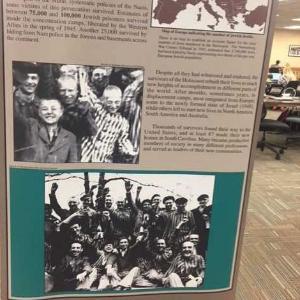 Schiller’s advocacy to Holocaust remembrance has taken numerous forms. His wife, Eleanor Schiller, was a teacher at Chabad Jewish Academy in Myrtle Beach in 1997 when she began a project to present in tangible terms the scale of the Holocaust among children. The Butterfly Project derived from the title of a poem “I Never Saw Another Butterfly,” written by a boy in a Jewish ghetto during World War II, and grew into a global effort to create and gather 1.2 million paper butterflies. The project elicited donations from five continents, and the butterflies were displayed on the lot next to the school on Holocaust Remembrance Day in 1998. In addition, Hugo and Eleanor were instrumental in the creation of a Holocaust Memorial in Myrtle Beach, unveiled in 2016 on Crabtree Lane in the Market Common district.
Schiller’s advocacy to Holocaust remembrance has taken numerous forms. His wife, Eleanor Schiller, was a teacher at Chabad Jewish Academy in Myrtle Beach in 1997 when she began a project to present in tangible terms the scale of the Holocaust among children. The Butterfly Project derived from the title of a poem “I Never Saw Another Butterfly,” written by a boy in a Jewish ghetto during World War II, and grew into a global effort to create and gather 1.2 million paper butterflies. The project elicited donations from five continents, and the butterflies were displayed on the lot next to the school on Holocaust Remembrance Day in 1998. In addition, Hugo and Eleanor were instrumental in the creation of a Holocaust Memorial in Myrtle Beach, unveiled in 2016 on Crabtree Lane in the Market Common district.
Kassandra Wypych, a freshman communication major, said the lecture left several impressions upon her.
“One large issue that came to my mind is the fact that this isn’t over,” said Wypych. “Unfortunately, there will always be people who won’t agree with our religion, or our race, or our sexuality.”
Wypych also felt admiration for Schiller himself.
“He made his life story into a lesson to teach the future adults of our generation not to let history repeat itself.”
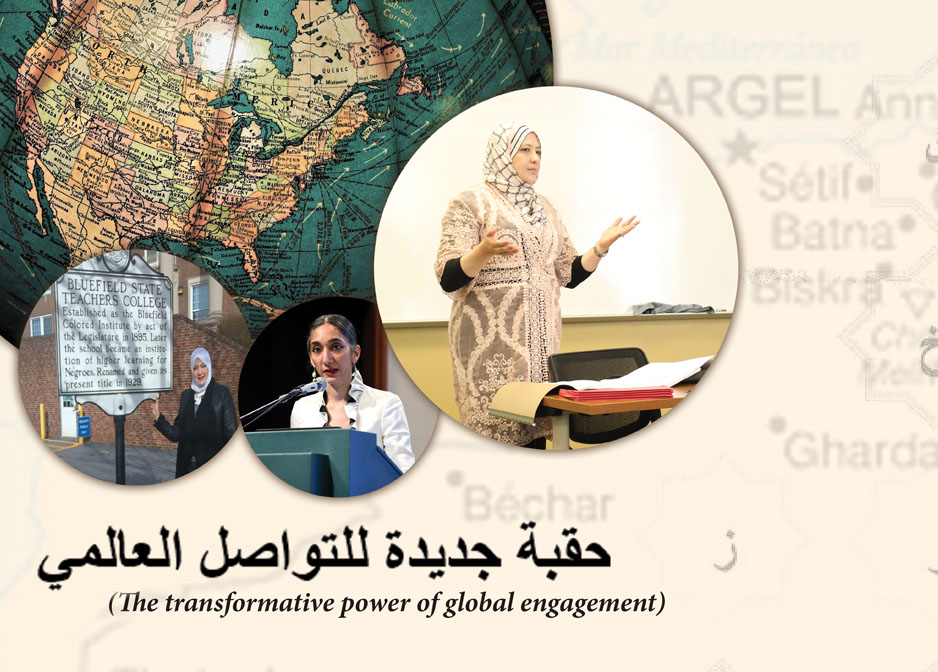
The Transformative Power of Global Engagement
When Mimouna Zitouni arrived at Coastal Carolina University from Algeria in August 2017, she brought a new global perspective to share with students, faculty and the community. Zitouni’s 10-month stay as CCU’s first Fulbright scholar also brought new opportunity to the institution. With her visit, CCU has achieved a new level of academic prestige that paves the way for additional scholars and, potentially, a new program of study.
The Fulbright program, founded by U.S. Senator J. William Fulbright in 1946, is a competitive American scholarship program that allows for educational international exchange among students, scholars, teachers and scientists and is designed to enhance cultural understanding between Americans and individuals in countries throughout the world. 
Tripthi Pillai, associate professor in the Department of English and coordinator of the Arts and Humanities Global Experience Program, was the central facilitator for the Fulbright experience and Zitouni’s residency. Pillai said the Fulbright scholarship was both the first step in a larger strategic plan for the University and a lengthy process that involved an interview and evaluation to determine CCU’s commitment to the program.
“CCU actively wanted our environment to diversify by having more international scholars come and stay for longer periods of time,” said Pillai. “For the Fulbright committee, we drew up an entire plan of what we are hoping to achieve with the scholarship experience and how this is going to transform the academic landscape of Coastal Carolina University.”
Transformation was central to Zitouni’s experience at CCU. On a campus of 12,000 students, faculty and staff, she was the only person wearing hijab. For many of her students, Zitouni’s entrance to the classroom was their first personal encounter with an individual wearing a veil. The progression of her classes involved not only the traditional patterns of teaching and learning, but also equally critical daily exchanges of honest, open dialogue.
“The experience involved a transfer of culture, of a way of living,” said Zitouni. “They would ask me about stereotypes, and I could answer the why and the what and the how. These stereotypes were about my country and North Africa in general; I shared my knowledge about politics in the region, media and religion, particularly as someone who wears the veil.”
An associate professor of sociolinguistics, computer-mediated discourse, and English for Specific Purposes at the University of Oran, Algeria, Zitouni’s appointment at CCU involved teaching two classes in Fall 2017: Introduction to Arabic (Arabic 110) and Literature across Cultures (English 277). In Spring 2018, she taught Beginning Arabic II (Arabic 120). Blending academic material and general cultural information elicited interest from her students.
“She told me about people my age from Algeria – their interests, their lives,” said Joshua Parsons, a student in Zitouni’s English course. “She’s always open to questions. In the beginning, a lot of students were very timid; they didn’t really know how to react, and they were expecting her to be very religious and very strict.But she kept it light and fun. She taught us stuff students can think of in their lives outside academia.”
Pillai noticed initially that students were interested in the subject matter of Zitouni’s courses, but as the fall semester progressed, she realized the extent of learning taking place both inside and outside the classroom.
“This is the first Arabic offering we’ve had, and the classes were full – overfull, if anything,” said Pillai. “Students were really curious about the language, and they sustained their interest throughout. Mouna fostered that curiosity, and her office hours became teaching environments where she talked with students not simply about their work but about aspects of their curiosity. She’s really embraced her responsibility as a cultural ambassador for her country and for the language that she’s here to teach and the culture that she represents.”
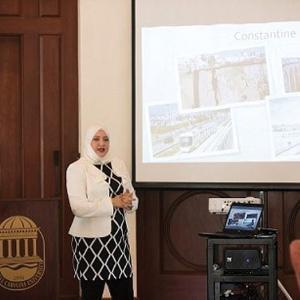 In addition to teaching, Zitouni presented at CCU classes across disciplines and traveled to Appalachian State University in Boone, N.C., and Bluefield State College in Bluefield, W.Va., to give presentations on her language and culture. She also attended academic conferences in Miami, Las Vegas, Tampa and Washington, D.C. She credited CCU administrators Dan Ennis, dean of the Edwards College of Humanities and Fine Arts, and Darla Domke-Damonte, associate provost for Global Initiatives, with broadening her opportunities and Suheir Daoud, associate professor of politics, and numerous other faculty members with making her feel at home.
In addition to teaching, Zitouni presented at CCU classes across disciplines and traveled to Appalachian State University in Boone, N.C., and Bluefield State College in Bluefield, W.Va., to give presentations on her language and culture. She also attended academic conferences in Miami, Las Vegas, Tampa and Washington, D.C. She credited CCU administrators Dan Ennis, dean of the Edwards College of Humanities and Fine Arts, and Darla Domke-Damonte, associate provost for Global Initiatives, with broadening her opportunities and Suheir Daoud, associate professor of politics, and numerous other faculty members with making her feel at home.
“This has been a very good experience for me,” said Zitouni. “I am very grateful to CCU. It is an excellent academic institution because of its people.”
Plans are underway for CCU to continue involvement with Fulbright programs and to develop a program with a focus in Arabic, in large part due to the success of this year’s residency.
“The way my students saw me for the first time in class and now, it’s totally different,” said Zitouni. “One hundred percent. And that’s the goal of international exchange: to be able to see through the eyes of the other.”
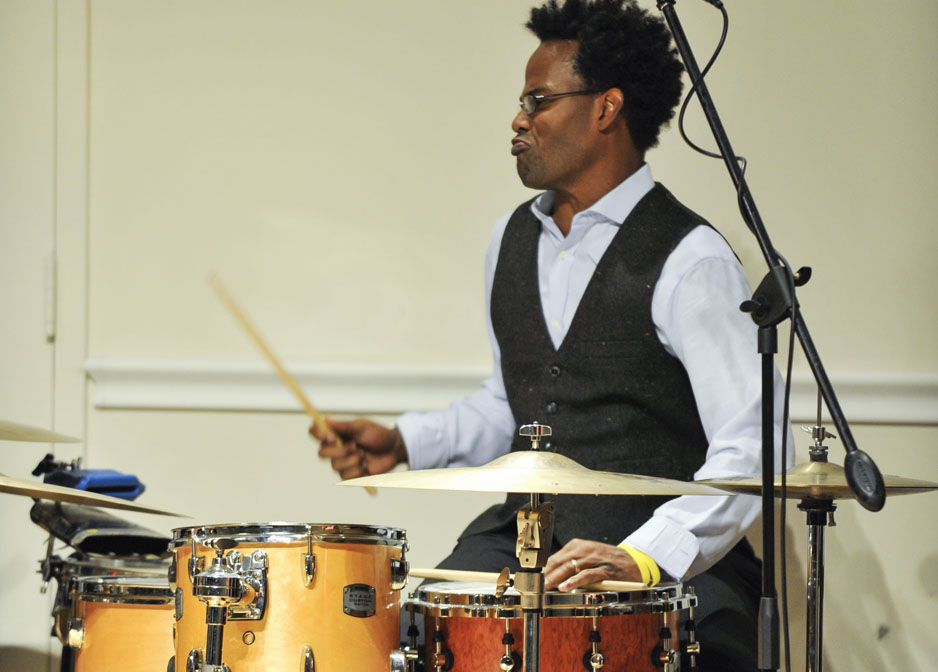
Pick Up the Tempo
The rhythm reaches beyond your ears. The beat takes up residence in your solar plexus, and the rolls reverberate down your spine. When a master drummer is onstage, the entire audience sits up and takes notice.
Such was the case when Kobie Watkins performed at CCU in September 2017. The audience didn’t have to know that Watkins had played and recorded with jazz legends Sonny Rollins and Branford Marsalis in order to recognize Watkins’ expertise. They didn’t need to be jazz aficionados to understand they were in the presence of a drummer who’s been around the block and across the country. Through his performance, Watkins made it clear – both to the audience and to his fellow performers – that a new level of energy and expectation had taken up residence on the Edwards Recital Hall stage.
Tim Fischer, assistant professor of music who performed with Watkins, said it’s important for CCU students in the music program to have direct access to an artist of Watkins’ ability and stature.
“If we were all in New York City, you’d be surrounded by that vibe, but it’s a different level of energy here in Conway,” said Watkins. “So, it’s important to have visiting musicians who can model that level of dedication and intensity of what they’re doing – to do it at the highest level.”
Watkins performed with Fischer on guitar as well as Matt White, associate professor in the Department of Music, on trumpet; the CCU student Jazz Combo, including Nick Lewis on trombone, Bobo Ferguson on tenor saxophone, Tyler Hughes on bass, Conner Miller on piano, Tyrice Murray on drums and Cynthea Kelley on vocals; and guest artist Brett Belanger on bass.
Fischer said the performance was an exhilarating, cooperative and memorable experience.
“We watched him drive the entire band through music, not through his words,” said Fischer. “He told us all what we needed to be doing. You could either rise to that level or be steamrolled by him.”
A native of Chicago, drummer/percussionist and educator Watkins has cultivated dynamic relationships with peers in the jazz, Latin and gospel genres and has recorded with a laundry list of jazz greats including Joe Lovano, Curtis Fuller, Bob Mintzer and Jim Hall. After earning a bachelor’s degree in music education from Vandercook College of Music in 1999, Watkins became a public school band director by day; by night he played gigs around Chicago, earning the nickname “Swing Master of Chicago.” He earned a Master of Music from Northwestern University in jazz pedagogy in 2003.
Over the two days of Watkins’ visit, he worked with students one on one, in ensemble rehearsals and in a classroom setting, providing instruction, feedback and insights on a life in the music industry. He wanted them to focus on mastering music fundamentals and honing their craft before they put themselves out in the world. Perhaps some of his most compelling stories focused on his playing with the iconic Rollins.
“Melody is the most important thing about jazz,” said Watkins as he discussed his work. “That’s the cool thing about Sonny Rollins; he played the song, and he played the song a lot. Even when we were playing the tune, he played the melody a lot. He probably restated the melody, six, seven, 15 times.” On the importance of pedagogy, Watkins emphasized the benefits to both the student and the instructor.
“Teaching reinforces the need to just stay active and loving,” said Watkins.
Whether they were in the audience, on the stage or in the classroom, CCU music students experienced jazz on a whole new level during Watkins’ visit. “It’s very difficult for our students to achieve that level of musicianship, that level of focus, and for a guest artist to model that behavior for our students is very important,” said Fischer.
Hearing it – both music and insight – straight from the source in a face-to-face context brought the streets of Chicago right to the CCU campus in Conway.





